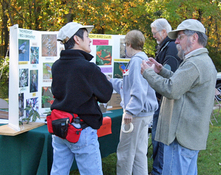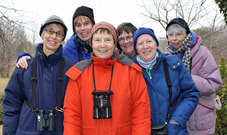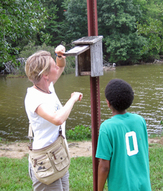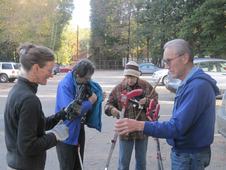Community Events

The Piedmont Bird Club conducts a variety of community outreach activities throughout the year. The Club’s community activities are in keeping with its focus on birds, but also reflect its commitment to environmental and conservation issues. Ongoing activities are listed below. Please check the calendar as the specific dates become available in late summer.
Annual Bird Counts

The Audubon Christmas Bird Count is the longest running Citizen Science survey in the world, and has been conducted in Greensboro for over 75 years, under protocols set up by the National Audubon Society. The information gathered in this important citizen-science effort is used by conservation biologists, researchers, and other wildlife organizations to track trends in bird populations, identify bird species and habitats that are in decline, and guide conservation efforts.
Volunteers are assigned in a group to cover a particular territory in Guilford County on the designated Count Day in early December, keeping a record of all birds they see and hear. We also have counters who do a “feeder watch” during the Count Day, checking their feeders and backyards at intervals to get a count of birds visiting the feeders and yards.
The Spring Bird Count is conducted locally in late April, under the same guidelines as the Christmas Bird Count.
The Christmas Count data are reported to National Audubon and are published on its website. The Spring Count data are compiled by the Carolina Bird Club
For more information or to volunteer to be a counter, send an email to [email protected].
Volunteers are assigned in a group to cover a particular territory in Guilford County on the designated Count Day in early December, keeping a record of all birds they see and hear. We also have counters who do a “feeder watch” during the Count Day, checking their feeders and backyards at intervals to get a count of birds visiting the feeders and yards.
The Spring Bird Count is conducted locally in late April, under the same guidelines as the Christmas Bird Count.
The Christmas Count data are reported to National Audubon and are published on its website. The Spring Count data are compiled by the Carolina Bird Club
For more information or to volunteer to be a counter, send an email to [email protected].

The Great Backyard Bird Count is an annual four-day event in February for bird watchers of all ages. Count for 15 minutes on one day or as long as you like every day to help create a real-time snapshot of where the birds are.
Bluebird Nest Box Monitoring

Our largest ongoing citizen-science project involves monitoring the activity of a total of 95 nest boxes at Country Park, Price Park, Keeley Park, Gateway Research Park, and Peabody Park. The boxes are surveyed each year, several times each week, from April through August. We record data on nesting habitat and the success of Eastern Bluebird nesting. The data are sent to the North Carolina Bluebird Society and the Cornell NestWatch program as part of their efforts to better understand and protect bluebird and other cavity nesting bird populations and their habitat. In addition to Eastern Bluebirds, we also see Carolina Chickadees, Brown-headed Nuthatches, House Wrens, and Tree Swallows using the nest boxes.
Volunteers are needed to help with the monitoring, April through August. A day of monitoring typically requires 1–2 hours, and you may sign up for as many days/weeks as you wish. Training will be provided prior to nesting season.
For more information or to volunteer to be a counter, send an email to [email protected].
Volunteers are needed to help with the monitoring, April through August. A day of monitoring typically requires 1–2 hours, and you may sign up for as many days/weeks as you wish. Training will be provided prior to nesting season.
For more information or to volunteer to be a counter, send an email to [email protected].
Habitat Restoration and Planting
The PBC helps with the restoration and maintenance of bird habitat in the City of Greensboro. Woven Works Park is one of four parks that mark the corners of the Downtown Greenway. In addition to paying tribute to Greensboro’s textile history, Woven Works Park is home to the Bird, Bee, and Butterfly Pollinator Garden, filled with native plants that attract all kinds of wonderful creatures. The PBC works in collaboration with the North Carolina Native Plant Society and the T. Gilbert Pearson Audubon Society to help maintain the Garden. We will also be adding the Bird & Butterfly Meadow at Price Park to our gardening project list this year. This 2.5-acre plot of land is located on the Price Park property and is filled with plants specifically planted to attract pollinators of all kinds.
We schedule activities that include removing invasive plants, weeding, and planting native shrubs and flowers. These events offer the perfect opportunity to help our community while learning more about native plants, pollinator gardens, and the animals that need these habitats. Experienced gardeners are always on hand at these events to guide volunteers, so no gardening experience is necessary. All supplies necessary for these events are provided.
We schedule activities that include removing invasive plants, weeding, and planting native shrubs and flowers. These events offer the perfect opportunity to help our community while learning more about native plants, pollinator gardens, and the animals that need these habitats. Experienced gardeners are always on hand at these events to guide volunteers, so no gardening experience is necessary. All supplies necessary for these events are provided.
Park/Stream Cleanups
|
The PBC organizes group cleanup events each year, focusing on trash pickup and beautification of areas that we frequent while birdwatching. This year we have scheduled three cleanup events: a stream cleanup in a section of Buffalo Creek, a park cleanup at Price Park/Highwoods Trail (a great birding trail!), and a stream cleanup in cooperation with UNCGs Audubon Campus Chapter in Peabody Park on the UNCG campus. We are always open to new parks or other areas in need of group trash cleanups, so please let us know if you have suggestions. All supplies are provided for these events, and all ages are welcome. Bring your friends and family, and help us make a difference!
|

